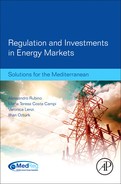Foreword
European Union (EU) energy policy is centered on three key objectives: security of supply, sustainability, and competitiveness. To step-up our efforts to reach these long-established goals, earlier this year the European Union launched a strategy to create a resilient Energy Union with a forward-looking climate policy. In today’s ever more competitive world, and with the growing need for more resources, it is clear that our Energy Union can only be successful if the EU works closely with its partners around the world.
It should come as no surprise, then, that the Energy Union strategy identified our partnership with the Mediterranean region as a priority. After all, the southern and eastern Mediterranean countries are long-standing partners of the EU. Our regions often have to face similar energy challenges and it is logical that wherever possible we should work together to find solutions. Energy needs in the southern and eastern Mediterranean countries are rapidly growing, as the population rises. Ensuring that the energy supply to households and businesses is secure, and that its production and use are competitive and sustainable, are therefore key challenges we have in common.
To rise to these challenges in the Mediterranean, substantial new investments are needed, be it in infrastructure to transport gas from newly discovered sites or in new technologies to help tap into the enormous potential of renewables in the area.
Yet, for the necessary investments to happen, a stable and harmonized regulatory framework is a must. In an attempt to offer this stability to investors and to facilitate the integration of national markets in the region, the Association of Mediterranean Energy Regulators (MEDREG) was created in 2007. Last November, MEDREG organized its first forum in Barcelona, focusing on the challenges of creating a stable regulatory climate that would attract the much-needed investments in energy infrastructure.
Furthermore, MEDREG entered into a Memorandum of Understanding with the European Commission and the Association of Mediterranean Transmission System Operators for Electricity, with the aim of establishing a platform on regional electricity markets.
We have now embarked on a broader process, designed to inject new impetus into EU–Mediterranean cooperation. Three new Unions for the Mediterranean platforms have been unveiled recently – one for gas, one for a regional electricity market, and one for renewables and energy efficiency. These platforms will also encourage dialog, facilitate partnerships, and strengthen cooperation between the countries of the Union of the Mediterranean.
The main focus of the cooperation platforms will be on market integration, developing new sustainable energy technologies, and removing regulatory, infrastructure, and investment barriers in the region. They will explore the possibilities of developing gas production in North Africa and Eastern Mediterranean countries for domestic markets and export to the EU. They will also identify ways to gradually remove technical, regulatory, and infrastructure barriers for the free trade in electricity across international borders. Furthermore, discussions will focus on how to promote the right regulatory frameworks and markets to encourage investments in renewables and energy efficiency in the region.
MEDREG has a key role to play in the success of all three new platforms, and in particular in the electricity platform. A cornerstone of the EU Energy Union will be a fully functioning and efficient internal market transporting energy from where it is produced to where it is needed. This internal market must be linked up with modern infrastructure and it must ensure a level playing field for all energy companies, including the producers of renewable energy. While price signals will be the main drivers of market development, the role of independent energy regulators will also be vital.
The European Commission sees the integration of regional markets in the Mediterranean region as key to cost-efficient investments and we are therefore encouraging the development of a regional electricity market in the area. Market integration will boost security of supply on both sides of the Mediterranean and provide the right signals to investors. Investors in the energy sector need long-term planning and vision on the choice of fuel mix in a country or a group of countries, and in addition they need to operate in a stable and transparent legal and regulatory framework.
There is strong support from investors in the energy market in the Mediterranean area – the success of last year’s MEDREG forum and the results of the public consultation on the Investment Report on infrastructure interconnections, launched by MEDREG in 2014, prove this.
This April, one of the largest AC synchronous grids in the world, ENTSO-E’s Continental Europe grid, was extended to Turkey, serving an additional 75 million consumers. This move boosts trade in electricity, allows more sharing of power reserves, more security, and mutual help in emergency situations. This is a major step forward toward the energy market integration of non-EU countries with Europe.
The European Commission welcomes this move to build a common approach between Mediterranean partners. Working together we can create the kind of environment that can trigger the right investments and the common vision we need to cope with the energy challenges we face – from coping with increased energy consumption and supporting new technologies to removing barriers and fostering market integration. The kind of environment that will also present us with new opportunities for revitalized cooperation across the Mediterranean region.
